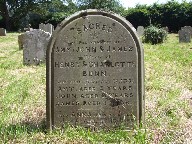| |
|
This
church is one of those sold off by the Anglican
diocese in an ill-conceived attempt to
rationalise its resources in the late 1970s. It
was bought by the reclusive Sir John Gooch of
Benacre Hall, whose ancestors are buried here;
but neglect set in, and for many years the church
languished in its overgrown graveyard. And then,
Sir John died, with the consequent sale of the
Hall and its contents, which made the national
headlines for raising 10 million pounds. The church
was inherited by Sir John's brother, Sir Timothy
Gooch of Covehithe. When I
first visited, in the autumn of 1998, the
churchyard had just been cleared, and it was
possible once more to enter the porch. It looked
as though someone might be taking care of St
Michael again. Coming back in 2011, everything
seemed well-cared for, the churchyard trim and
the guttering in good order. The only crimp was
that it wasn't possible to step inside the church
itself. Instead, I wandered around the graveyard,
which is small, but there are a couple of good
18th century headstones, and another with a
moving inscription to Amy, James and John Bunn,
three children aged 3 and under who all died on
the same day in 1851.
| Pevsner visited here in
1959, and found the 18th century Gooch
tombs, some nice round-backed box pews,
and a surviving squire's pew. As I say,
it isn't possible now to see inside - the
Gooch family keep it locked as their
mausoleum - but you can gaze through the
big chancel windows easily enough, and
see some of the memorials, as well as a
decent east window which must have been
installed not long before redundancy. Every
Suffolk church has its ghost, I'm sure.
But here at Benacre on my first visit,
the clearing of the undergrowth had
revealed a large wooden board. I turned
it over, and discovered, as well as a
sizable ecosystem, that it was the church
sign, which had stood at the gate, as it
does in almost every other Suffolk
churchyard. Still attached to rusty
drawing pins were the rotten remains of a
notice, perhaps even the redundancy order
of 20 years before.
|
|
 |
|
|
|

